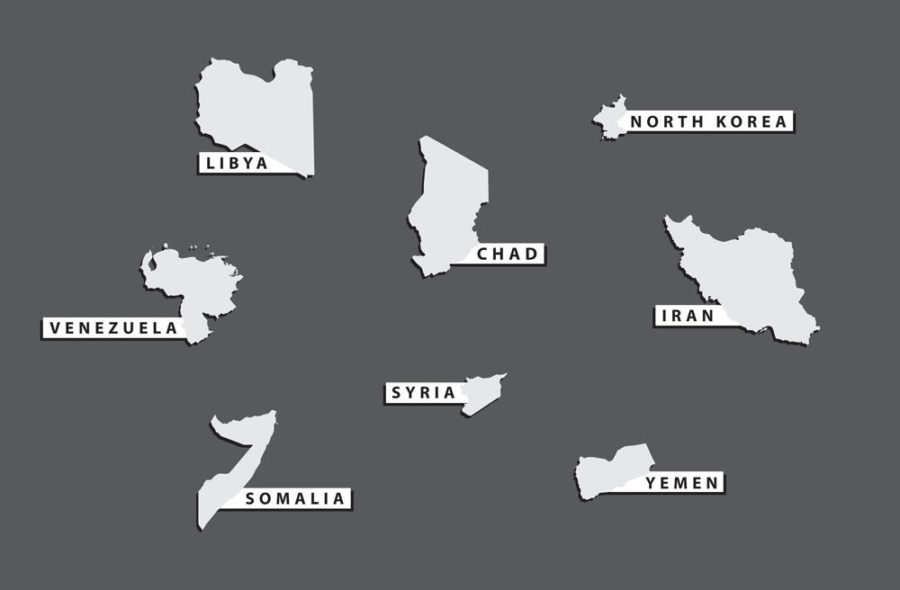ISSO director talks about recent immigration
October 4, 2017
Rahma Belaid, junior in aerospace engineering, thought her brother was joking when he told her about the travel ban.
The news broke January of her sophomore year that President Donald Trump signed an executive order, banning travel to U.S. from seven majority-muslim countries.
One of the banned countries was Libya, Belaid’s home country. After spending two years away from her family, Belaid planned to go home to support her sister, who requested Belaid be there for her difficult surgery.
“People would say that ‘[Trump] wouldn’t dare do this. Don’t take him seriously,’ but it was just one week and he did all this damage,” Belaid said.
Belaid said she could not risk going home this summer making it exactly three years since the last time she saw her family.
In less than two weeks, the most recent travel ban — announced by Trump Sept. 24 — will take affect. Eight countries including Chad, Iran, Libya, North Korea, Syria, Venezuela, Yemen and Somalia will face bans on travel to the U.S.
The latest travel ban comes after a review of nearly 200 countries, according to the presidential proclamation. Greg Siskind, an immigration lawyer who wrote about the ban, said there were three criteria for a country to determine whether a citizen traveling from the U.S. should or should not be deemed a threat.
Unlike the previous bans, each country’s restrictions on travel differ. The proclamation called Libya an important counterterrorism partner of the U.S., but fails to share public-safety and terrorism-related information. The entry of B-1 business visitors, B-2 tourists and B-1/B-2 nonimmigrants is suspended. Most students have a F visa giving Libyan students the ability to travel.
For North Korea, Syria and Somalia, all immigrant and nonimmigrant travel is suspended. Iranian citizens with F, M and J visas will be subject to enhanced screening and vetting requirements.
“So, let’s pretend Illinois and Iowa are completely different countries… and you have to decide if you want to go to Iowa State University,” said Krista McCallum-Beatty, director of the International Students and Scholars Office.
Scholarships and an esteemed program could be drawing a prospective Illinoian student to Iowa State. McCallum-Beatty said adding the possibility of not seeing their family the entire time they are in school may mean Iowa State is no longer an option.
McCallum-Beatty said enrollment of international students remained flat compared to last fall. She said there could be a future effect on those numbers because of the bans.
She said researchers at the university are affected by the ban as well. Many collaborate with researchers from other countries and with the ban, this makes it difficult to work with academics from those countries.
Martino Harmon, senior vice president for student affairs, said he will do all that he can to help these students, but said there are circumstances beyond the university’s control.
“Even if it doesn’t impact directly the students and scholars that we have, there’s an indirect impact of who’s next, what’s going to happen next. It’s kind of tricky times in which we live,” Harmon said.
Sixteen countries were deemed “inadequate” and 30 others were deemed “at-risk” of being inadequate based on the following criteria:
-
The country is unable to provide information needed to determine whether applicants for visas are who they claim to be.
-
The country cannot provide information on whether people seeking entry pose national security or public-safety risks.
-
The country is “a known or potential terrorist safe haven, whether it is in the Visa Waiver Program and whether it fails to receive its national subject to final orders of removal from the US,” Siskind wrote.
After the 50-day engagement period, many countries improved their cooperation with the U.S., the White House claims.
“As president, I must act to protect the security and interests of the United States and its people,” Trump said in a presidential proclamation. “I am committed to our ongoing efforts to engage those countries willing to cooperate, improve information-sharing and identity-management protocols and procedures, and address both terrorism-related and public-safety risks.”

















